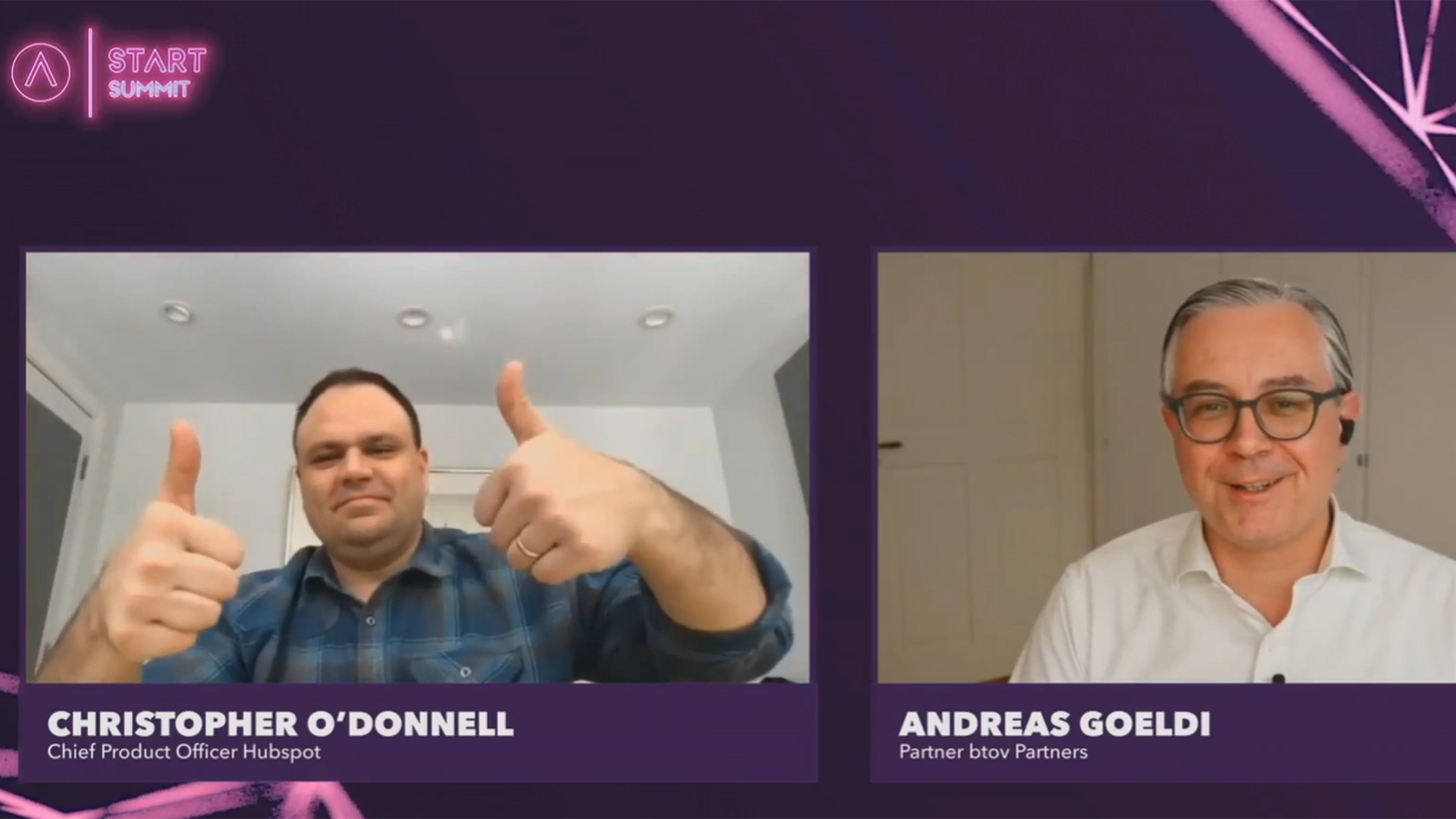Background - 24.03.2021 - 00:00
START Summit x Hack 2021: Personal insight from various entrepreneurs
Day two of this year’s START Summit showed the great diversity of the program, both in theme and in diversity of speakers. The key speakers, who mostly had an entrepreneurial background, were willing to share stories from their personal struggles in business.
Source: HSG Newsroom

24 March 2021. Day two of the START Summit’s 2021 online edition was good proof of the diverse program the students of the University of St.Gallen have put together. Markus Witte, founder of the German e-learning platform Babbel, kicked off with a confession: “I wasn’t a very engaged student.” Nevertheless, he became an academic and in 2007 founded the world’s first language learning app. “Find strength, where your weaknesses are”, was his advice for aspiring entrepreneurs. Are entrepreneurs born or made? “Many stumble into it. I don’t believe there is an entrepreneurial DNA.”
Good advice from India
The day’s program also featured two speakers who were not entrepreneurs but who work for two of the hottest SaaS companies: Rajalakshmi “Raji” Srinivasan, Director Product Management at Zoho Corporation delivered a very personal speech full of good advice on how to balance your personal, professional and family time – an important factor to be sustainably successful. Furthermore, she advised young professionals to openly accept challenges: “Look at it as an opportunity to learn on the go. During my 21 years at Zoho, my learning never stopped. Don’t look only to superiors – learn also from peers and subordinates.”
Raji Srinivasan advice: “Accept challenges, if you want to succeed!”
Christopher O'Donnell, Chief Product Officer of Hubspot was interviewed by HSG Alumnus Andreas Goeldi, one of the companies’ first clients. Founded by two MIT graduates, Hubspot is considered as one of the biggest success stories in SaaS. Built on the idea of “inbound marketing”, it is a very customer-centric company as Christopher O’Donnell described it in a recent blog post. “Customer experience is everything.” Moreover, the culture seems to be one of the company’s biggest assets. “Our culture is about autonomy and the people at the frontline having power.” Anecdotally he added: “Some software engineers claim to have shipped more code to customers in 48 hours at Hubspot than elsewhere in three years.”
Christopher O’Donnel and Andreas Goeldi proved to be enthusiastic advocates for Hubspot.
Coping with uncertainty
Jay Kreps, Co-Founder & CEO of Confluent, talked about Kafka. Not the famous writer but the increasingly popular open source infrastructure software. In times of Big Data, the importance of applications like Apache Kafka is constantly growing. “The idea of Kafka is to think about data in motion – not in rest,” he explained. Jay Kreps built Confluent to offer Kafka-based managed cloud services to companies. Initially, success was limited. “Despite our excitement, nobody was interested.” Eventually, it became a core system for companies like Uber and Netflix which helped spread the word. Today the number of users roughly doubles every year. “Starting a company was harder than I thought, because initially nobody believes in it.” It took him a good year to mentally cope with the stress of uncertainty.
To describe the uncertainty in the early days of start-ups, Jay Kreps used a metaphor from Poker: “You can play a good hand and still lose but also play a weak hand and win.”
Serial entrepreneur Anna Alex (Planetly, Outfittery) touched on the subjects of purpose and profit – and how to bring it together. Her new venture Planetly offers digital tools that help companies reduce their carbon footprint. “Sustainability is the next digital”, she stressed a quote from this year’s WEF. She expects climate neutral companies to become the new norm, because of employees, customers, investors, costs and regulations. “If you have a strong purpose but cannot scale it, you won’t have a lot of impact.” Therefore, she made the case for a strong purpose combined with a solid business model.
Hire for attitude – train for skills
Tim Stracke, Co-CEO of Chrono24 was interviewed by Fabian Tausch, who started his Jungunternehmer Podcast at the age of 19. Chrono24 is a leading marketplace for high-quality watches with a transaction volume of around two billion Euros per year. “We are one of the very few consumer-oriented German tech companies with such a dominant market position.” After failing with his previous marketplace business, his original idea was to make something he liked. Instead of competing against Chrono24 he bought it after fierce negotiating that lasted a whole year. According to him, a major challenge for start-ups is to find the right team. His advice: “Hire for attitude – train for skills.”
Reversing the revenue model
The implication of the digital transformation for media outlets was presented by Felix Graf, CEO of the Neue Zürcher Zeitung (NZZ). The tradition-rich media company has undergone profound changes – but so has the whole industry. While the media maintains its importance as the fourth estate, its traditional business model was disrupted when ad revenue increasingly shifted towards Google, Facebook etc. The NZZ changed its strategy in 2014 focusing more on a subscription model. After some difficulties in the first years, subscriptions now contribute around 80 percent to the overall revenue, also thanks to a recent surge during the pandemic. “In order to succeed on this path, you need to build a strong customer base and adopt a customer-centric view. You need to bring up topics that are interesting to the public –while maintaining a strong stance.”
Felix Graf showed how ad revenue has crumbled in the last 20 years. However, the NZZ seems to have found the right strategy to deal with it.